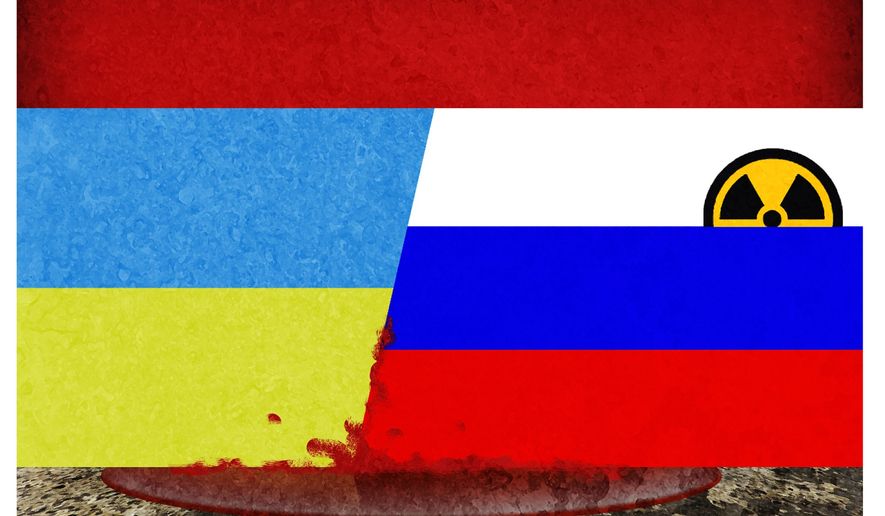OPINION:
During the Cold War and its aftermath, U.S. security policy has been premised on defensive alliances — NATO and similar arrangements in the Middle East and Asia. And various free trade arrangements under the umbrella of the World Trade Organization to forge common prosperity among allies.
The conditions underlying decades of stability were upended by Europe’s self-inflicted dependence on Russian natural gas, Russia’s invasion of Ukraine, and the rise of China and its military ambitions in the Pacific.
The military and economic arrangements were premised on the notions that deterrence and economic sanctions — for example, an adequate army in Europe that made a Russian thrust through the Fulda Gap impractical, the capacity for smaller wars in places like Iraq and Afghanistan and putting the economic screws to malefactors like Iran — would ensure peace among the big powers.
As long as Russia was the only big threat — read, China remained backward and less consequential — the West did not need a big war offensive strategy.
Anyone with eyes to see can determine that the sanctions on Russia may be painful but that the wounds inflicted on the European economies from high natural gas prices may be just as damaging.
Russia may not be getting top dollar from India, China and other Asian outlets for its oil. Still, it’s getting the cash needed to purchase Iranian and North Korean weapons, and its masses are not revolting.
This winter, the Europeans are devoting some $700 billion to mitigate households’ high energy prices and vast sums of private capital to restructure European industry to bear the higher cost of imported liquefied natural gas.
We must ask who has more staying power: Ukraine, with its cities obliterated by Russian rockets and the European and American polities underwriting it, or Vladimir Putin’s regime?
The only legitimate peace would entail Russia withdrawing from all Ukrainian territory, the return of kidnapped Ukrainians and reparations for the damage imposed by its military.
Otherwise, Russians will learn to sell their gas and oil in Asia, get what they need through willing Chinese and Indian entrepreneurs, rebuild their military and come at Ukraine again and eventually other Eastern European states. And China will conclude it can cross the Strait of Taiwan without the risk of lasting costs.
The only path to legitimate peace in Ukraine — and warning to China in Asia — is to better arm Kyiv’s forces with weapons to strike deep inside Russia to destabilize Mr. Putin’s hold. And to prepare the West for direct kinetic participation.
If Russia crosses the line with tactical nuclear weapons or further sabotages European infrastructure — like its attacks on the Nord Stream pipeline and a German railroad — the West should destroy Russian naval, air and military assets in the Mediterranean, Syria and Libya and cut off its access to Iranian materiel.
Only fighting Russia on Ukrainian soil is folly. No amount of air defenses can intercept 100% of Russia’s missiles and drones — the territory is too vast. Russia can access as many of those as it needs, even if only 10% of them get through, to bomb the Ukrainians into winter darkness and win a war of attrition.
Western countermeasures would give Beijing pause.
We can’t win a war in Taiwan alone — either without allies or fighting just in the Strait. The Chinese military could keep our Navy out and deny our aircraft access unless we accept huge losses.
Beijing must be convinced that from the moment the first rocket hits Taiwan soil, conflict with the United States becomes global. And what that means for its access to oil and gas, the U.S. dollar payments system and the safety of any vessel, plane or other Chinese assets anywhere on the globe.
As much as armies, economies fight wars, and no nation is self-sufficient these days. The economies of scale required to make advanced semiconductors preclude a new autarky as a viable policy.
The CHIPS Act will fall short of creating self-sufficiency for the United States, especially in times of war. Still, it is insanity to leave the international distribution of supply chains to free markets alone. With almost one-fifth of the global GDP, that gives Chinese fingers too many pinch points.
Fashioning free trade among Western nations alone won’t suffice because China can invest billions in industrial policies to accomplish dominance in critical technologies.
The CHIPS Act and similar initiatives in Europe and elsewhere could undermine efforts to create Western prosperity and an integrated military-industrial base unless those are pursued cooperatively.
The Europeans object to the Buy America provisions of the CHIPS Act. We should open participation to our Western allies if they put in place equally accessible programs in proportion to the size of their economies.
Multilateralism is hardly an unalloyed good, but when coupled with teeth and realistic economic cooperation, it still offers the best path forward.
• Peter Morici is an economist and emeritus business professor at the University of Maryland, and a national columnist.




Please read our comment policy before commenting.